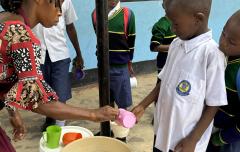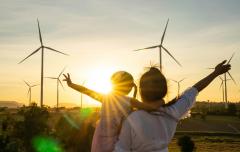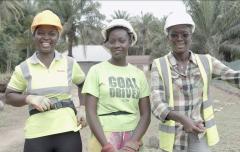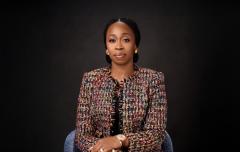Democratizing energy in Latin America and the Caribbean one step at a time
By Alice Driver
 Before 2006, Roberto Ossandón, a farmer who lives in Chacay Alto in the rural mountains of northern Chile, depended on candles for lighting and caught up on news during rare trips to the nearest town. Thanks to an off-grid solar PV project financed by the IDB and other organizations, that year 3,100 rural houses and schools in the region, including Ossandón’s, received panels.
When I visited Ossandón in October 2014, he was working in his garden, and only bare red mountains were visible in all directions for as far as the eye could see. I wanted to know how the panel had impacted his life, and he replied, “I use it for lights and for the radio. It has functioned well for eight years.” CONAFE, a local energy company regularly maintains the panels, and this has allowed them to provide uninterrupted service 24 hours a day 365 days a year to rural populations. Ossandón is just one of many whose quality of life has been improved by the goal to reach universal access.
Providing 100% energy access is a goal that countries must put in human terms in order to think about how providing basic energy services can improve lives.
Sustainable Energy for All Americas (SEforALL Americas), which forms part of the United Nations SEforALL initiative, aims to increase projects like these in the region: Its main priorities are:
Before 2006, Roberto Ossandón, a farmer who lives in Chacay Alto in the rural mountains of northern Chile, depended on candles for lighting and caught up on news during rare trips to the nearest town. Thanks to an off-grid solar PV project financed by the IDB and other organizations, that year 3,100 rural houses and schools in the region, including Ossandón’s, received panels.
When I visited Ossandón in October 2014, he was working in his garden, and only bare red mountains were visible in all directions for as far as the eye could see. I wanted to know how the panel had impacted his life, and he replied, “I use it for lights and for the radio. It has functioned well for eight years.” CONAFE, a local energy company regularly maintains the panels, and this has allowed them to provide uninterrupted service 24 hours a day 365 days a year to rural populations. Ossandón is just one of many whose quality of life has been improved by the goal to reach universal access.
Providing 100% energy access is a goal that countries must put in human terms in order to think about how providing basic energy services can improve lives.
Sustainable Energy for All Americas (SEforALL Americas), which forms part of the United Nations SEforALL initiative, aims to increase projects like these in the region: Its main priorities are:
 Before 2006, Roberto Ossandón, a farmer who lives in Chacay Alto in the rural mountains of northern Chile, depended on candles for lighting and caught up on news during rare trips to the nearest town. Thanks to an off-grid solar PV project financed by the IDB and other organizations, that year 3,100 rural houses and schools in the region, including Ossandón’s, received panels.
When I visited Ossandón in October 2014, he was working in his garden, and only bare red mountains were visible in all directions for as far as the eye could see. I wanted to know how the panel had impacted his life, and he replied, “I use it for lights and for the radio. It has functioned well for eight years.” CONAFE, a local energy company regularly maintains the panels, and this has allowed them to provide uninterrupted service 24 hours a day 365 days a year to rural populations. Ossandón is just one of many whose quality of life has been improved by the goal to reach universal access.
Providing 100% energy access is a goal that countries must put in human terms in order to think about how providing basic energy services can improve lives.
Sustainable Energy for All Americas (SEforALL Americas), which forms part of the United Nations SEforALL initiative, aims to increase projects like these in the region: Its main priorities are:
Before 2006, Roberto Ossandón, a farmer who lives in Chacay Alto in the rural mountains of northern Chile, depended on candles for lighting and caught up on news during rare trips to the nearest town. Thanks to an off-grid solar PV project financed by the IDB and other organizations, that year 3,100 rural houses and schools in the region, including Ossandón’s, received panels.
When I visited Ossandón in October 2014, he was working in his garden, and only bare red mountains were visible in all directions for as far as the eye could see. I wanted to know how the panel had impacted his life, and he replied, “I use it for lights and for the radio. It has functioned well for eight years.” CONAFE, a local energy company regularly maintains the panels, and this has allowed them to provide uninterrupted service 24 hours a day 365 days a year to rural populations. Ossandón is just one of many whose quality of life has been improved by the goal to reach universal access.
Providing 100% energy access is a goal that countries must put in human terms in order to think about how providing basic energy services can improve lives.
Sustainable Energy for All Americas (SEforALL Americas), which forms part of the United Nations SEforALL initiative, aims to increase projects like these in the region: Its main priorities are:
- To provide universal access planning for the region, so countries will have detailed National Plans for Universal Access to Modern Energy by 2019.
- To map global, regional, and local institutions working in sustainable energy. In order to organize efforts, build off each other’s strengths, and avoid duplication of work, players in the region want an online database that maps the major players and initiatives in the region.
- To improve energy information by providing access to reliable energy data and reports for the region. The goal is to provide an online platform that coordinates all the relevant publications and tools related to sustainable energy projects in the region.



